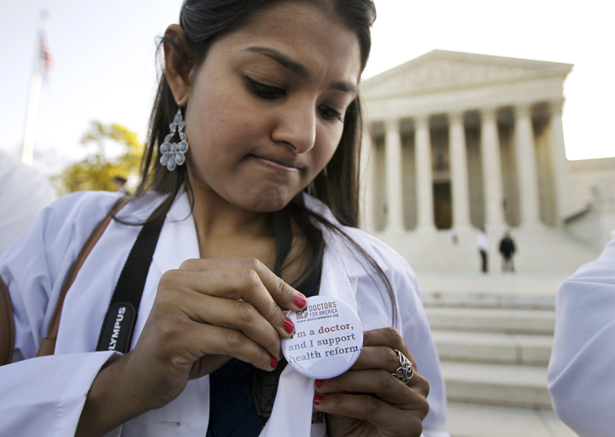
Dr. Sonia Nagda puts on a pin supporting the healthcare reform law signed by President Obama as she gathers with other healthcare professionals in front of the Supreme Court in Washington, Monday, March 26, 2012. (AP Photo/Charles Dharapak)
There is much consternation in liberal circles this afternoon, as the arguments before the Supreme Court about health care reform’s crucial individual mandate don’t seem to have gone very well. “A bad day for Obamacare’s supporters,” writes Ezra Klein. “I think this law is in grave, grave trouble,” said Jeffrey Toobin.
I tend to give more credence to the accounts that things weren’t actually that bad—the questioning during these proceedings is not predictive of the final outcome, and Justice Anthony Kennedy has plenty of room to side with the government—but it’s worth considering what would happen if, indeed, the individual mandate is junked.
To give a nickel-version of the dispute here: under health care reform, the federal government will begin requiring people to purchase private health insurance in 2016, or face a $695 penalty. (People who can’t afford it would get an exemption). Opponents of the law argue this is an unconstitutional coercion of individuals by the federal government, while the administration argues it is within Congress’s right to require the purchase of health insurance under the Commerce Clause of the Constitution. The reasoning is that the federal government clearly has the power to regulate the health insurance industry under that clause, as it spans every state in the nation.
If the Court strikes down the mandate, then the part of health care reform that forbids health insurance companies from denying coverage to people with pre-existing conditions would almost certainly be repealed. If the government forbid those denials but didn’t force people to first buy a plan, then plenty of people would just wait until they got sick to buy insurance.
This would be a critical blow to one of the central premises behind health care reform. Re-instituting the individual mandate would be unconstitutional. So what then?
One obvious option, besides just doing nothing and allowing health care costs to continue their exponential growth while more people lose coverage, is a single-payer health insurance plan. There is no doubt about the constitutionality here—the government is clearly allowed to levy taxes to fund public benefits. Medicare, for example, is not challengeable on the same grounds as Obama’s health care reform.
So if health care reform goes down, the next logical step may well be just extending Medicare to everyone. This was not politically possible in 2009, but perhaps the demise of “Obamacare” would make it moreso as legislators looked for other solutions. This is exactly what former Labor Secretary Robert Reich argued in the Huffington Post today:
With a bit of political jujitsu, the president could turn any such defeat into a victory for a single-payer healthcare system — Medicare for all.
If the Supreme Court strikes down the individual mandate in the new health law, private insurers will swarm Capitol Hill demanding that the law be amended to remove the requirement that they cover people with pre-existing conditions.
When this happens, Obama and the Democrats should say they’re willing to remove that requirement – but only if Medicare is available to all, financed by payroll taxes.
If they did this the public will be behind them — as will the Supreme Court.
Representative Dennis Kucinich sounded similar notes yesterday, saying that single-payer is on the way regardless:
The cost of health care continues to grow because the costs cannot be constrained within the context of that for-profit system. Whether the Supreme Court upholds the law or strikes it down, single-payer is the only alternative that can meet our nation’s needs.
As Kucinich is presumably suggesting, the health insurance exchanges set up under health care reform could be used as a vehicle for single-payer. Vermont is currently toying with that idea. That’s no doubt going to be a focus for progressives in coming years—and, paradoxically, the death of the individual mandate might aid that effort.


